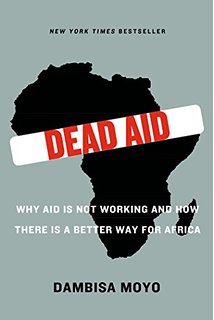By Dambisa Moyo.
Review By Jane Wales.
As the global financial crisis unfolds, those least responsible—our world’s poor—will be most affected. Many have called upon President Obama to uphold his campaign commitment to double foreign assistance. But Dambisa Moyo’s book, Dead Aid, challenges us to think again. Although we can all agree that ending poverty is an urgent necessity, there appears to be increasing disagreement about the best way to achieve that goal.
Born and raised in Lusaka, Zambia, Moyo has spent the past eight years at Goldman Sachs as head of economic research and strategy for sub-Saharan Africa, and before that as a consultant at the World Bank. With a PhD in economics from Oxford University and a master’s degree from Harvard University’s John F. Kennedy School of Government, she is more than qualified to tackle this subject.
In Dead Aid, Moyo comes out with guns blazing against the aid industry—calling it not just ineffective, but “malignant.” Despite more than $1 trillion in development aid given to Africa in the past 50 years, she argues that aid has failed to deliver sustainable economic growth and poverty reduction—and has actually made the continent worse off . To remedy this, Moyo presents a road map for Africa to wean itself of aid over the next five years and offers a menu of alternative means of financing development.
Moyo opens her case by writing, “Between 1970 and 1998, when aid flows to Africa were at their peak, poverty in Africa rose from 11 percent to a staggering 66 percent.” Today, Africa is the only continent where life expectancy is less than age 60. Sub-Saharan Africa remains the poorest region in the world, where literacy, health, and other social indicators have plummeted since the 1970s.
Pulling us through a quick history of aid, Moyo covers the many ways its intent and structure have been influenced by world events. She systematically challenges assumptions about the efficacy of the Marshall Plan, International Development Association graduates, and “conditionalities” that require adherence to prescribed economic policies. “By thwarting accountability mechanisms, encouraging rent-seeking behavior, siphoning away talent, and removing pressures reform inefficient policies and institutions,” aid guarantees that social capital remains weak and countries poor. And Moyo’s list of aid’s sins goes on—including the crowding out of domestic exports and raising the stakes for conflict.
So what does Moyo propose we do? In her own version of shock therapy, she asks, “What if, one by one, African countries each received a phone call, telling them that in exactly five years the aid taps would be shut off —permanently?” The shock would force them to create a new economic plan that phases in alternative financing mechanisms as aid is phased out, she argues. These new financing mechanisms should include increased trade (particularly among African nations and with emerging markets like China, India, and Brazil), foreign direct investment, entrance into international capital markets, and increased domestic savings through remittances and microfinance. The end goal is to phase reliance on aid down to 5 percent or less within five years.
Sound impossible? Moyo doesn’t think so. Implementing this plan will be “dead easy,” she claims, but will require political will. This political will, Moyo argues, must be rallied by Western activists, for they are the only ones with the ability and the incentive to drive change. “It is, after all, their money being poured down the drain.” She is not the first to call for a move away from aid dependency—although she may be the fiercest.
Moyo has only proven correlation, not causation, and although we can’t be sure how her prescriptions would hold up in the face of a global recession, she challenges us to think before we act. Moyo expands the boundaries of the development conversation—one that has become both more vibrant and more nuanced in recent months. Those of us rethinking aid can all agree that the time has come for deeper and more direct involvement of Africans in setting their own development course. As the African proverb goes: “The best time to plant a tree is twenty years ago. The second-best time is now.” Let us not waste any more time. Africa’s moment, and our moment, is now.




